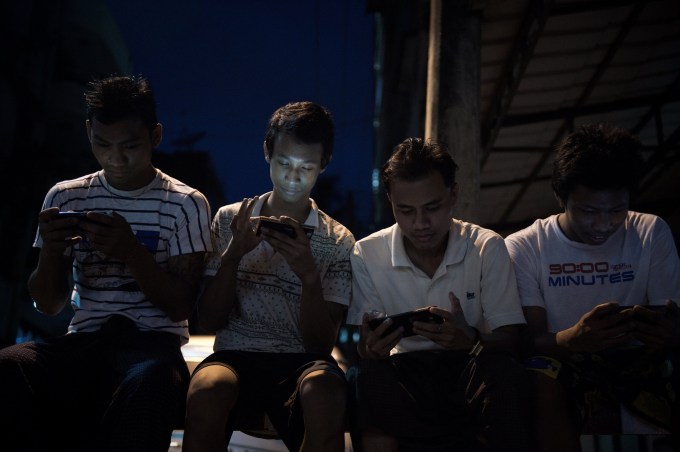Facebook purges more ‘bad actors’ in Myanmar but it still won’t commit to a local office
As Facebook continues to grasp the severity of the situation in Myanmar, where the UN has concluded that its social network plays “determining role” in inciting genocide, the U.S. tech giant has completed a third sweep in recent months to remove bad actors from its platform.
Facebook said late Tuesday U.S. time that it has removed a total of 135 Facebook accounts, 425 Pages, 17 Groups and an additional 15 Instagram accounts with this latest piece of action.
Facebook has around 20 million users in Myanmar — that’s nearly all of the country’s internet users and nearly 40 percent of the population — and it gave some stats on the reach that it has now nullified:
- Approximately 2.5 million people followed at least one of these Facebook Pages
- Approximately 6,400 people belonged to at least one of these Facebook Groups
- Approximately 1,300 people followed at least one these Instagram accounts
This is Facebook’s third such cull in recent months. Its previous removals impacted some high-profile individuals including Senior General Min Aung Hlaing, commander-in-chief of the armed forces, and the military-owned Myawady television network were removed from the social network following “evidence [that they] committed or enabled serious human rights abuses in the country.”
What’s notable about this newest action is that the company said it took action because of “the behavior of these actors rather than on the type of content they were posting.”
We’re waiting for further confirmation on exactly what that means, but acting irrespective of posted content would represent an interesting change in its policing, and it could impact Facebook’s efforts in Myanmar — and other areas — going forward.

Nearly everyone who has internet access in Myanmar uses Facebook, giving it an estimated user base of around 20 million. AFP PHOTO / Nicolas ASFOURI / Getty Images
That’s promising but, unfortunately, it appears that Facebook is still reluctant to commit to opening a local office in Myanmar. That’s something that local civic groups on the ground in Myanmar — who have worked with Facebook to improve the situation — have called a key requirement for meaningful progress.
“How many companies have 20 million users in one country but don’t have a single employee, it’s absurd,” Jes Petersen — CEO of accelerator firm Phandeeyar, which is part of the advisory group — told TechCrunch last month. “An office would go a long way to building relationships with stakeholders.”
Facebook declined to comment on the possibility of a Myanmar-based office when we asked.
The company has pledged to increase the number of Burmese translators working on Myanmar-based content to 100 by the end of this year. It has said a number of times that it is working on AI-based solutions, too, but cracks still appear.
Equally, while reaching 100 translators means Facebook has more than doubled its Burmese-compliant content checking contingent, the figure is dwarfed by others. Myanmar’s army reportedly has 700 people working on its own Facebook strategy.
Sources familiar with the company’s thinking told TechCrunch that Facebook is concerned that “there would be real risks involved” if it were to open an office, “including the potential for increased government leverage on content and data requests as well as potential risks to Facebook’s employees.”
That response is backed, according to the sources, by the findings of a BSR report that was released last month.
If this is consistent with the company’s strategy then it is troubling because that doesn’t tell the whole truth of what is a very nuanced issue.
While it is correct that the report did mention the potential risks associated with an office — around both the safety of staff and potential for government pressure — the conclusion wasn’t that Facebook shouldn’t open the office. It was that there are “advantages and disadvantages” to it doing so.
So you could equally argue that it should open an office if you choose to focus the positive argument from the report.
More generally, it is certainly ironic that Facebook is (partially) citing insight from a report that it controversially released on the eve of the U.S. mid-term elections, a move that many took as an effort to bury the findings while the news cycle was focused on a key political moment.
While it may not get the same press attention as Russian-backed U.S. election meddling, the Facebook-Myanmar situation is a key one to watch in 2019. Facebook is the de facto internet in Southeast Asia and other emerging markets so its influence extends beyond anything people in Western markets can begin to imagine.

